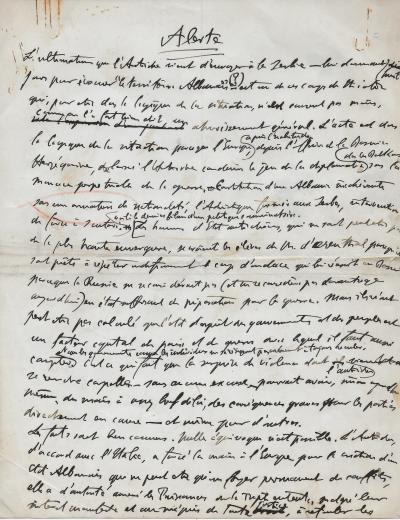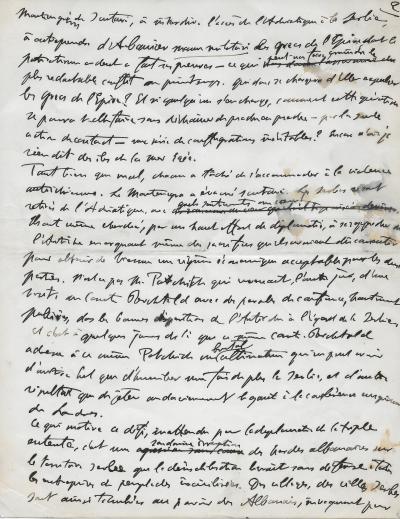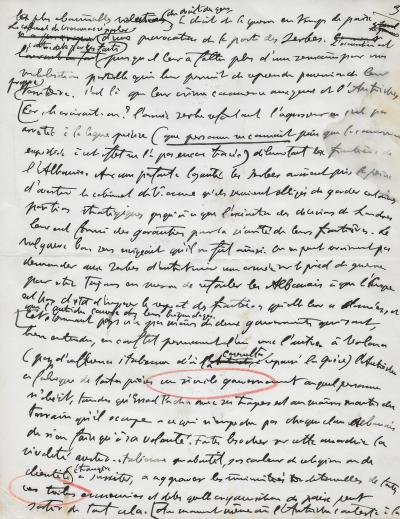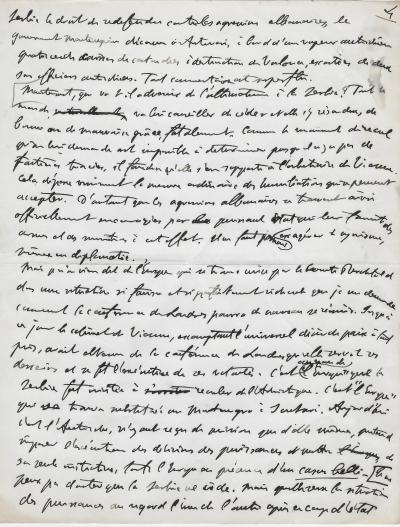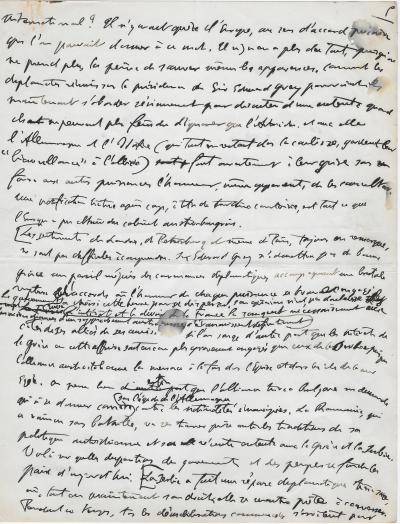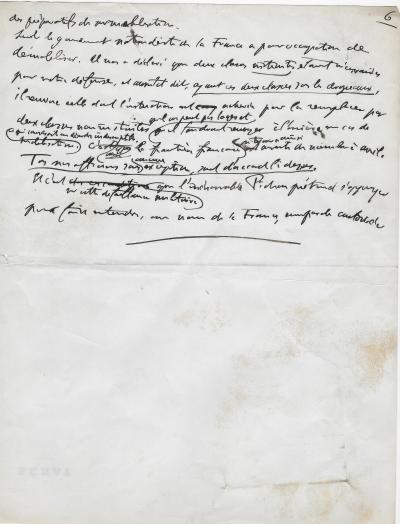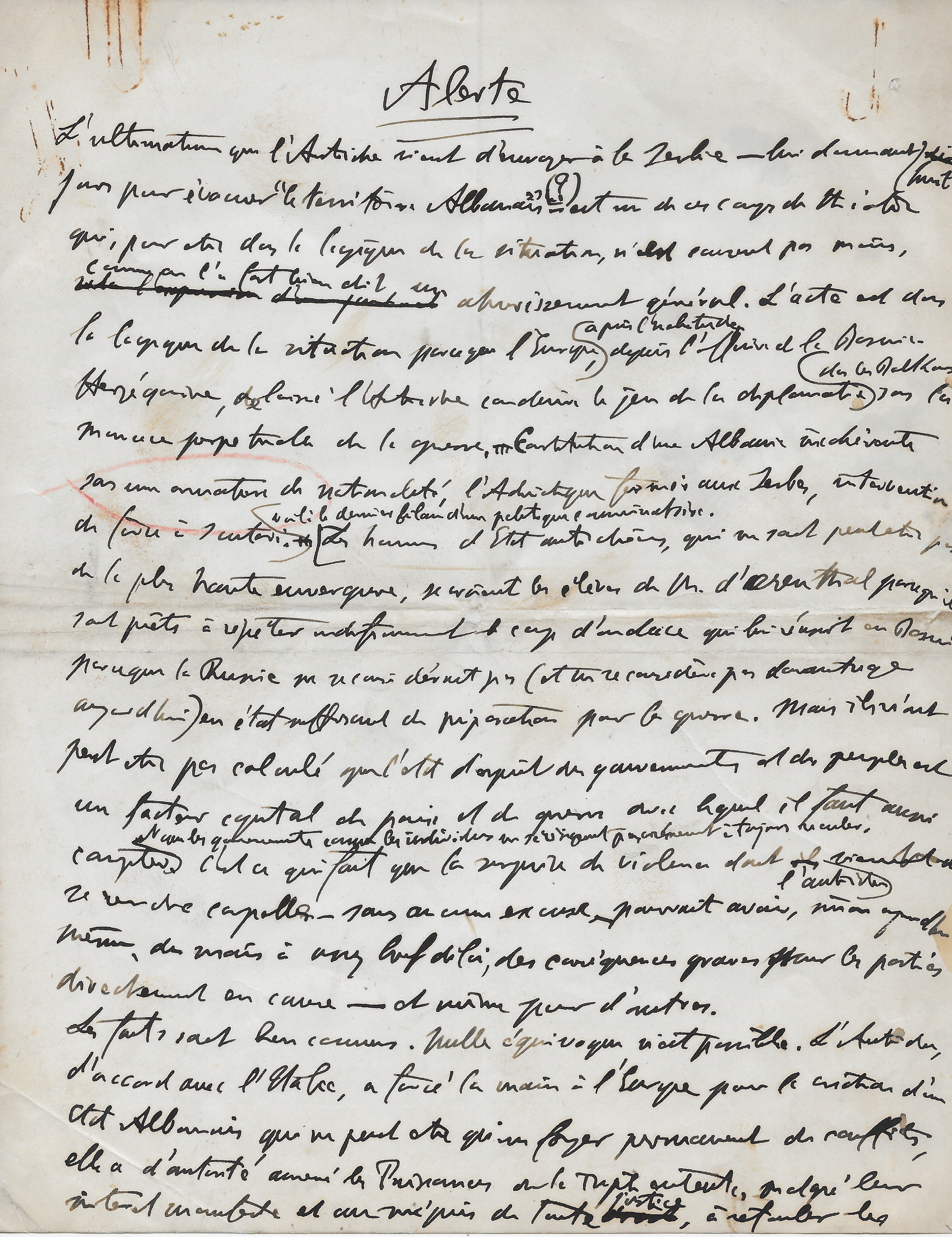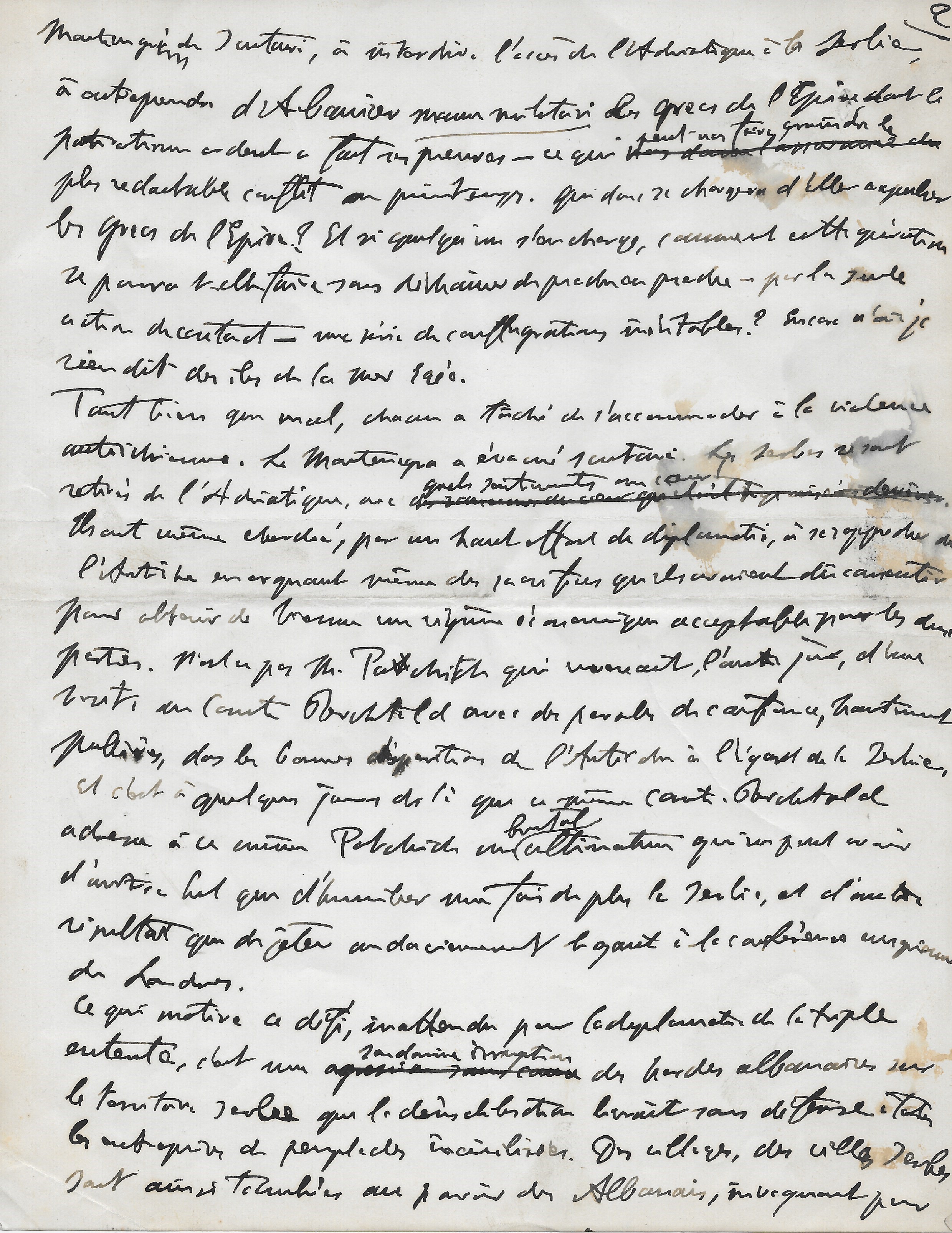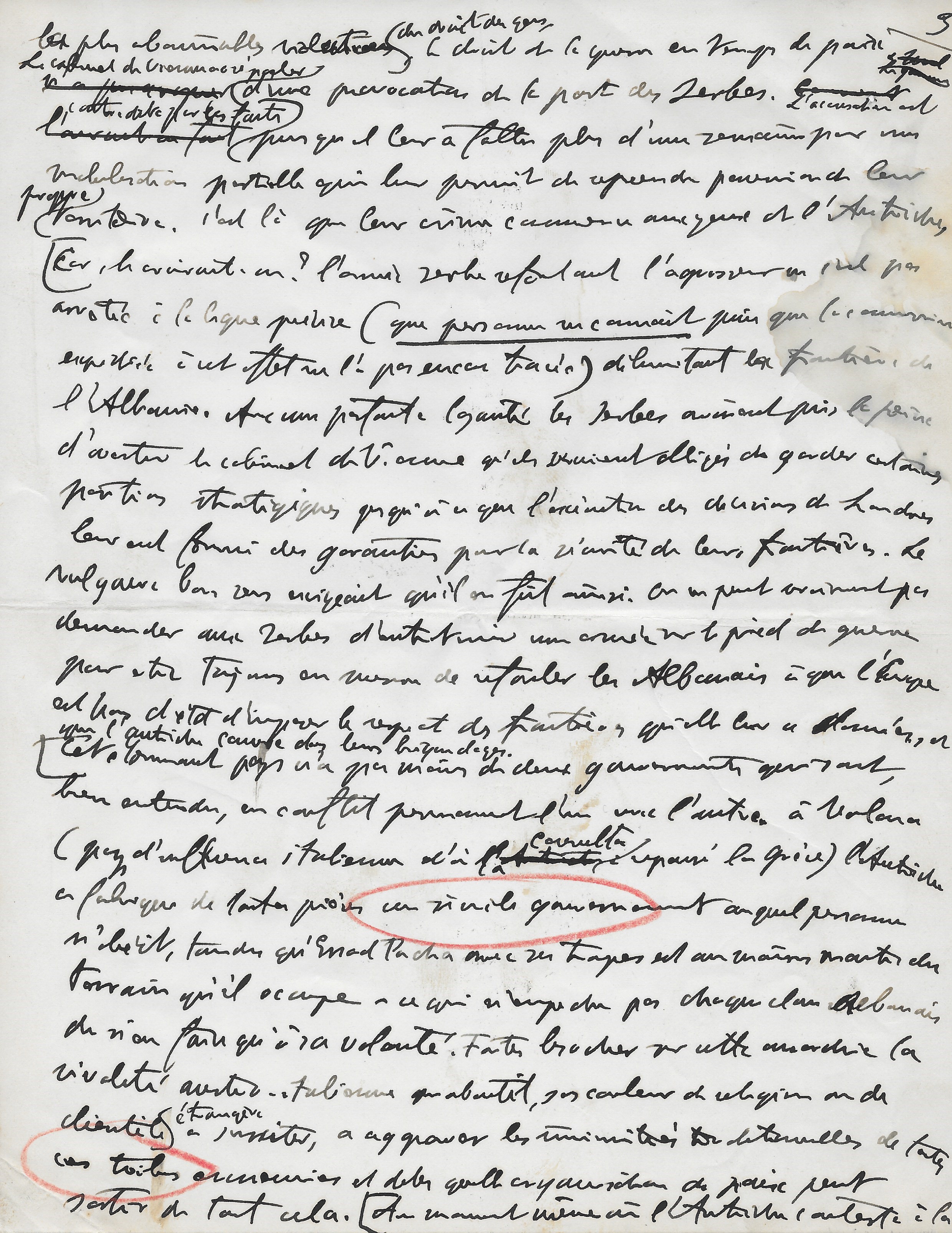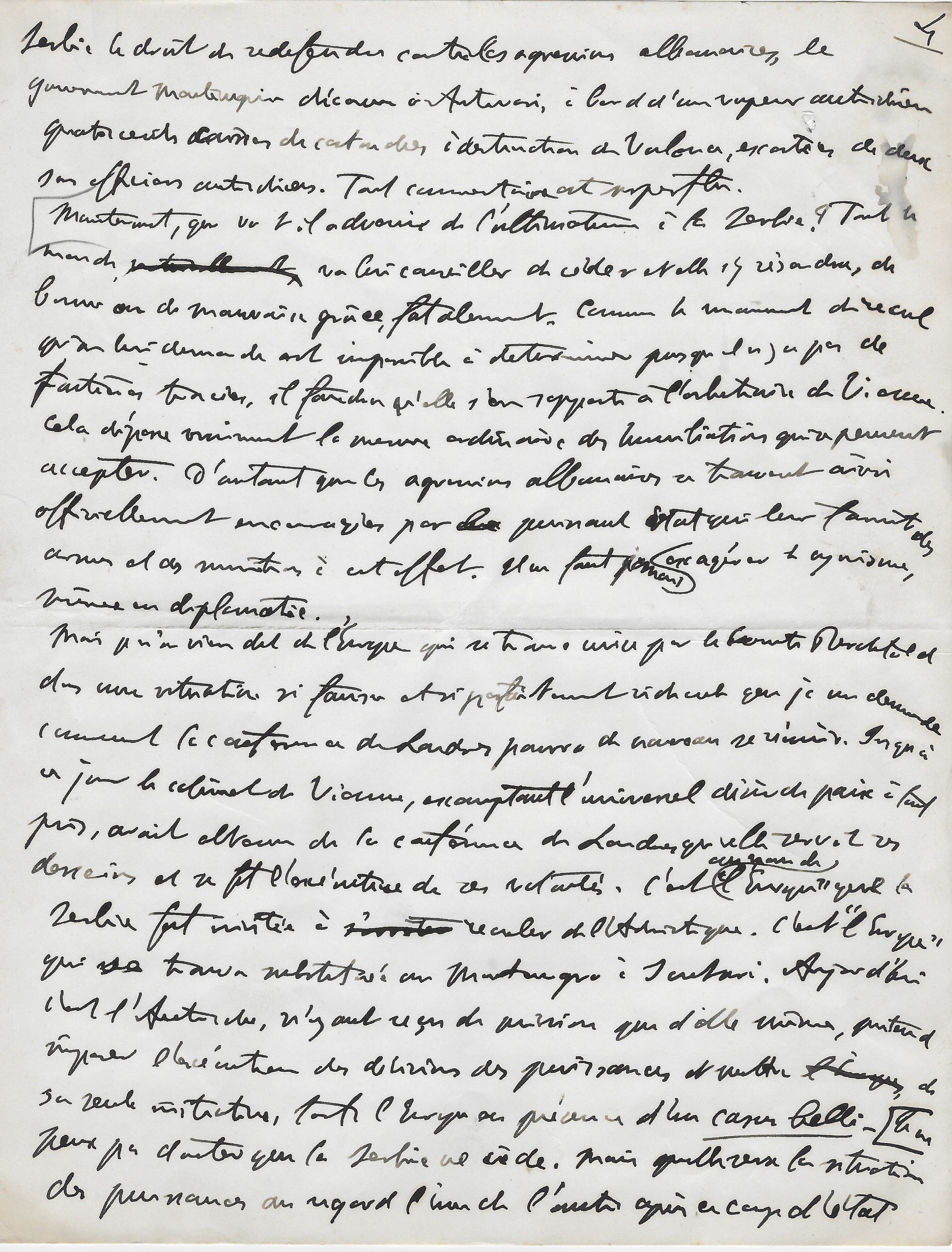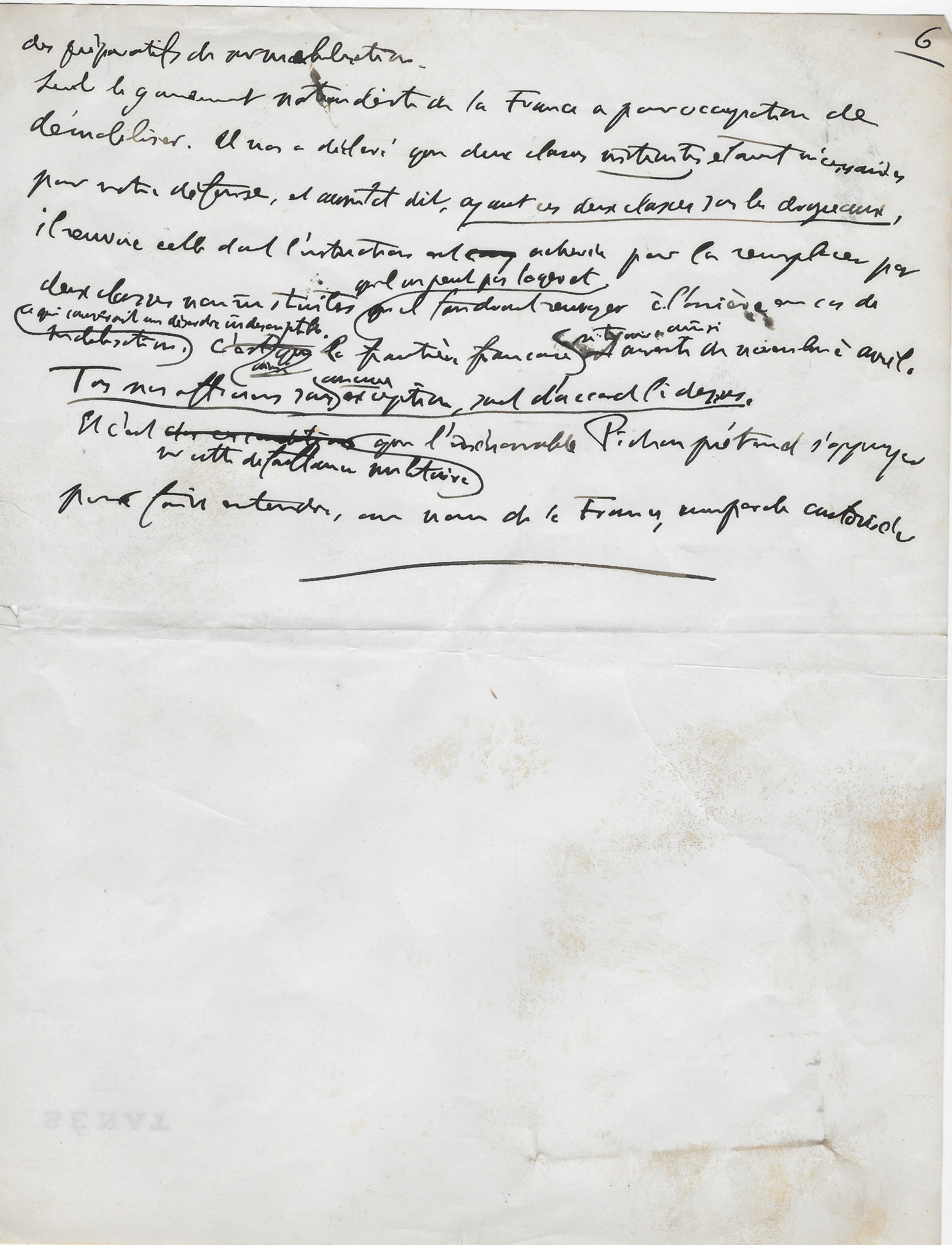Georges CLEMENCEAU - Autograph manuscript - First World War 1914
Georges CLEMENCEAU (1841 - 1929), French journalist and statesman
Autograph manuscript entitled "Alert". Slnd (Early July 1914); 5 pages ½ in-4°.
Article with numerous erasures, annotations and additions with a view to being published in Clemenceau's daily newspaper, "l'Homme libre", at the beginning of July 1914.
Historical article by Clemenceau giving a fine analysis of the complexity of the political issues between the different protagonists in the powder keg of the Balkans, following the assassination of Archduke Franz Ferdinand of Austria by a Serbian nationalist, on June 28, 1914, who triggered the Austro-Hungarian Empire's ultimatum to Serbia. A month later, Europe was set ablaze by four years of conflict between empires which spread to other countries with nearly ten million dead and missing and twenty-one million wounded and mutilated: "The ultimatum that Austria has just sent to Serbia asking it to do everything to evacuate Albanian territory (?) is one of those blows from the Austrians which, to be in the logic of the situation, is often not no less, as has been well said, a general bewilderment. The act is in keeping with the logic of the situation because Europe has become accustomed since the offensive in Bosnia-Herzegovina to letting Austria lead the game of diplomacy in the Balkans under the perpetual threat of war, constitution of an incoherent Albania without a… of nationality, the Adriatic provided to the Serbs, intervention of force to support the anti-tank statesmen, who does not know perhaps of the highest scale, will serve the students of M . of Arenthal because they are ready to indifferently repeat the stroke of audacity which succeeded in Bosnia because Russia did not reconsider (and does not reconsider any more today) in a sufficient state of preparation for war. But they may not have calculated that the state of mind of the government and the people is a crucial factor in peace and war that must also be taken into account (…). This is why the surprise violence of which Austria seems to be guilty - without any excuse, could have, even today, at least in a relatively short period of time, serious consequences on the parties directly involved - the same for the others. The facts are well known. No ambiguity is possible. Austria, in agreement with Italy, forced the hand of Europe for the eviction of an Albanian state which can only be a permanent source of conflicts, it authoritatively brought the Powers of the Triple Entente, despite their manifest interest and in defiance of all justice (...) to prohibit access to the Adriatic from Serbia, to undertake to Albanize manu militari the Greeks of the spine whose ardent patriotism has made its evidence - which can make us fear the most formidable conflict in the spring. Who will be responsible for cutting off the Greeks from the empire? And if someone is in charge, how can this deprivation be done without unleashing preachi or preacha - through the sole action of contact - a series of inevitable conflagrations? Yet I have said nothing about the Aegean islands. As best they could, everyone tried to accommodate themselves to Austrian violence. Montenegro evacuated Scutari. The Serbs withdrew from the Adriatic, with what feelings in their hearts. They even sought, through a high level of diplomatic effort, to get closer to Austria, even arguing about the sacrifices they had had to make to obtain from Vienna an economic regime acceptable to both parties. Was it not Mr. Pachitch who vowed, the other day, to come out to Count de Rothchild with highly public words of confidence in the serious dispositions of Austria towards Serbia, and it was a few days before this same Count Rothchild addressed to this same Pachitch a brutal ultimatum which could have no other aim than to once again humiliate Serbia, and no other result than to audaciously throw down the gauntlet the European coherence of London. What motivates this challenge, unexpected for the diplomacy of the Triple Entente, is a sudden irruption of Albanian herds on Serbian attempts (…). All autopsies of uncivilized peoples. Serbian villages and towns thus fell into the power of the Albanians, invoking the most abominable violations of international law, the law of war in times of peace [phrases crossed out] of a provocation on the part of the Serbs. The accusation is contradicted by the facts since it took them more than a week through a partial lucubration which allowed them to regain possession of their strike. This is where their crime begins in the eyes of Austria, the Serbian army pushing back the aggressor (…) to the precise line that no one knows then that the commission (…) demarcating the border of Albania. With perfect loyalty the Serbs had taken the trouble to warn the Vienna cabinet that they had been obliged to keep certain strategic parts until the execution of London's decisions had provided them with guarantees for the security of their borders. Common sense demanded that this be so. We really cannot ask the Serbs to maintain an army on a war footing to always be able to push back the Albanians on whom Europe is unable to impose respect for the borders it has given them. , and that Austria is smoldering with their brigandage. This amazing country has no less than two governments which are, of course, in constant conflict with each other. In Valona [city in present-day Albania] (country of Italian influence (…)) Austria fabricated a government that no one obeys, while Essad Pasha [officer of the Ottoman army he becomes dictator of Albania in October 1914] with his troops is at least master of the land he occupies and this does not prevent each Albanian clan from doing what it wants. Make this anarchy skewer the Italian vivacity which results, without color of religion or foreign clientele to arouse, in aggravating traditional enmities (…) what organization of peace can emerge from all this. At the very moment when Austria was contesting Serbia's right to defend itself against Albanian aggression, the Montenegrin government discovered in Antivari [a town in Montenegro], on board an Austrian steamer, four hundred cases of cartridges bound for Valona, escorted by two Austrian NCOs. Any comments are superfluous. Now, what will happen to the ultimatum to Serbia? Everyone will advise her to give in and she will do so, with good or bad grace, inevitably, as the moment of retreat that is asked of her is impossible to determine since there are no defined boundaries. , it will have to rely on the arbitrariness of Vienna. This really goes beyond the ordinary measure of humiliation that they can accept. Especially since Albanian aggressions are also officially encouraged by the powerful state which provides them with weapons and ammunition for this purpose. And never make organizations exaggerate even in diplomacy. But I said nothing about Europe which finds itself united by the Corum Mercato is in a situation so false and so perfectly ridiculous that I wonder how the London conference will be able to meet again. Until this day the Vienna cabinet, expecting the universal duty of peace at all costs, had obtained from the London conference that it served its purposes and acted as the executor of its retards. It was in the name of Europe that Serbia was invited to retreat from the Adriatic. It is "Europe", which finds itself substituted for Montenegro in Soutari [Ottomann Empire]. Today it is Austria, having received clarification only from itself, starting from imposing the execution of the decisions of the powers and putting, on its sole initiative, all of Europe in the presence of a casus belli. I cannot doubt that Serbia will give in. But what is the situation of the powers regarding each other after this international coup? There was only Europe, in the sense of precarious agreement that one could give to this word. There are none at all anymore, since we no longer take the trouble to even keep up appearances. How could the diplomats gathered under the presidency of Sir Edmond Gray now approach each other seriously to discuss an agreement when they can no longer pretend to ignore that Austria and with it Germany and Italy (which all by remaining in the coalition, maintain their "benevolence" towards Albania) openly do as they please without doing the other powers the honor, even apparent, of consulting them. A notification after the fact, (…) as a late courtesy, is all that Europe was able to obtain from the Austro-Hungarian cabinet. The feelings of London, Petersburg and even Paris, always in tow, are not difficult to understand. Sir Edmond Gray will not willingly admit such disregard for diplomatic propriety accompanying a brutal rupture of the agreement where the honor of each power is dismissed. The government chose this hour to disperse. His opinion is not to intervene. (…) France's interest and duty necessarily place it among the last chances of an Austro-Russian rapprochement (…). Alongside its allies and its friends, if we also consider that the interests of Greece in this affair are even more seriously engaged than those of Serbia since the Austro-Italian alliance threatens it both in the hope and in the Aegean Sea. We believe that the Turkish-Bulgarian alliance is only asking to come under the aegis of Germany against the emigrant nationalities. Romania, which won without a battle, will find itself caught between the traditions of its Austrian policy and its recent understanding with Greece and Serbia. These are the provisions of governments and peoples that today's peace is based on. Serbia made a very wise diplomatic response where everything is now debatable and is ready to talk. During this time, all demobilizations started are invited for pre-mobilization preparations. Only the nationalist government of France is in the business of demobilizing. He told us that two restrictive cases were necessary for our defense, and immediately said, when these two cases on the leaders, he sends back the one whose investigation is completed to replace it with two uninstructed cases which should be sent to the rear in the event of mobilization, which would cause indescribable disorder. The French border is always open from November to April. All our officers without any exception (…). »
Autograph manuscript entitled "Alert". Slnd (Early July 1914); 5 pages ½ in-4°.
Article with numerous erasures, annotations and additions with a view to being published in Clemenceau's daily newspaper, "l'Homme libre", at the beginning of July 1914.
Historical article by Clemenceau giving a fine analysis of the complexity of the political issues between the different protagonists in the powder keg of the Balkans, following the assassination of Archduke Franz Ferdinand of Austria by a Serbian nationalist, on June 28, 1914, who triggered the Austro-Hungarian Empire's ultimatum to Serbia. A month later, Europe was set ablaze by four years of conflict between empires which spread to other countries with nearly ten million dead and missing and twenty-one million wounded and mutilated: "The ultimatum that Austria has just sent to Serbia asking it to do everything to evacuate Albanian territory (?) is one of those blows from the Austrians which, to be in the logic of the situation, is often not no less, as has been well said, a general bewilderment. The act is in keeping with the logic of the situation because Europe has become accustomed since the offensive in Bosnia-Herzegovina to letting Austria lead the game of diplomacy in the Balkans under the perpetual threat of war, constitution of an incoherent Albania without a… of nationality, the Adriatic provided to the Serbs, intervention of force to support the anti-tank statesmen, who does not know perhaps of the highest scale, will serve the students of M . of Arenthal because they are ready to indifferently repeat the stroke of audacity which succeeded in Bosnia because Russia did not reconsider (and does not reconsider any more today) in a sufficient state of preparation for war. But they may not have calculated that the state of mind of the government and the people is a crucial factor in peace and war that must also be taken into account (…). This is why the surprise violence of which Austria seems to be guilty - without any excuse, could have, even today, at least in a relatively short period of time, serious consequences on the parties directly involved - the same for the others. The facts are well known. No ambiguity is possible. Austria, in agreement with Italy, forced the hand of Europe for the eviction of an Albanian state which can only be a permanent source of conflicts, it authoritatively brought the Powers of the Triple Entente, despite their manifest interest and in defiance of all justice (...) to prohibit access to the Adriatic from Serbia, to undertake to Albanize manu militari the Greeks of the spine whose ardent patriotism has made its evidence - which can make us fear the most formidable conflict in the spring. Who will be responsible for cutting off the Greeks from the empire? And if someone is in charge, how can this deprivation be done without unleashing preachi or preacha - through the sole action of contact - a series of inevitable conflagrations? Yet I have said nothing about the Aegean islands. As best they could, everyone tried to accommodate themselves to Austrian violence. Montenegro evacuated Scutari. The Serbs withdrew from the Adriatic, with what feelings in their hearts. They even sought, through a high level of diplomatic effort, to get closer to Austria, even arguing about the sacrifices they had had to make to obtain from Vienna an economic regime acceptable to both parties. Was it not Mr. Pachitch who vowed, the other day, to come out to Count de Rothchild with highly public words of confidence in the serious dispositions of Austria towards Serbia, and it was a few days before this same Count Rothchild addressed to this same Pachitch a brutal ultimatum which could have no other aim than to once again humiliate Serbia, and no other result than to audaciously throw down the gauntlet the European coherence of London. What motivates this challenge, unexpected for the diplomacy of the Triple Entente, is a sudden irruption of Albanian herds on Serbian attempts (…). All autopsies of uncivilized peoples. Serbian villages and towns thus fell into the power of the Albanians, invoking the most abominable violations of international law, the law of war in times of peace [phrases crossed out] of a provocation on the part of the Serbs. The accusation is contradicted by the facts since it took them more than a week through a partial lucubration which allowed them to regain possession of their strike. This is where their crime begins in the eyes of Austria, the Serbian army pushing back the aggressor (…) to the precise line that no one knows then that the commission (…) demarcating the border of Albania. With perfect loyalty the Serbs had taken the trouble to warn the Vienna cabinet that they had been obliged to keep certain strategic parts until the execution of London's decisions had provided them with guarantees for the security of their borders. Common sense demanded that this be so. We really cannot ask the Serbs to maintain an army on a war footing to always be able to push back the Albanians on whom Europe is unable to impose respect for the borders it has given them. , and that Austria is smoldering with their brigandage. This amazing country has no less than two governments which are, of course, in constant conflict with each other. In Valona [city in present-day Albania] (country of Italian influence (…)) Austria fabricated a government that no one obeys, while Essad Pasha [officer of the Ottoman army he becomes dictator of Albania in October 1914] with his troops is at least master of the land he occupies and this does not prevent each Albanian clan from doing what it wants. Make this anarchy skewer the Italian vivacity which results, without color of religion or foreign clientele to arouse, in aggravating traditional enmities (…) what organization of peace can emerge from all this. At the very moment when Austria was contesting Serbia's right to defend itself against Albanian aggression, the Montenegrin government discovered in Antivari [a town in Montenegro], on board an Austrian steamer, four hundred cases of cartridges bound for Valona, escorted by two Austrian NCOs. Any comments are superfluous. Now, what will happen to the ultimatum to Serbia? Everyone will advise her to give in and she will do so, with good or bad grace, inevitably, as the moment of retreat that is asked of her is impossible to determine since there are no defined boundaries. , it will have to rely on the arbitrariness of Vienna. This really goes beyond the ordinary measure of humiliation that they can accept. Especially since Albanian aggressions are also officially encouraged by the powerful state which provides them with weapons and ammunition for this purpose. And never make organizations exaggerate even in diplomacy. But I said nothing about Europe which finds itself united by the Corum Mercato is in a situation so false and so perfectly ridiculous that I wonder how the London conference will be able to meet again. Until this day the Vienna cabinet, expecting the universal duty of peace at all costs, had obtained from the London conference that it served its purposes and acted as the executor of its retards. It was in the name of Europe that Serbia was invited to retreat from the Adriatic. It is "Europe", which finds itself substituted for Montenegro in Soutari [Ottomann Empire]. Today it is Austria, having received clarification only from itself, starting from imposing the execution of the decisions of the powers and putting, on its sole initiative, all of Europe in the presence of a casus belli. I cannot doubt that Serbia will give in. But what is the situation of the powers regarding each other after this international coup? There was only Europe, in the sense of precarious agreement that one could give to this word. There are none at all anymore, since we no longer take the trouble to even keep up appearances. How could the diplomats gathered under the presidency of Sir Edmond Gray now approach each other seriously to discuss an agreement when they can no longer pretend to ignore that Austria and with it Germany and Italy (which all by remaining in the coalition, maintain their "benevolence" towards Albania) openly do as they please without doing the other powers the honor, even apparent, of consulting them. A notification after the fact, (…) as a late courtesy, is all that Europe was able to obtain from the Austro-Hungarian cabinet. The feelings of London, Petersburg and even Paris, always in tow, are not difficult to understand. Sir Edmond Gray will not willingly admit such disregard for diplomatic propriety accompanying a brutal rupture of the agreement where the honor of each power is dismissed. The government chose this hour to disperse. His opinion is not to intervene. (…) France's interest and duty necessarily place it among the last chances of an Austro-Russian rapprochement (…). Alongside its allies and its friends, if we also consider that the interests of Greece in this affair are even more seriously engaged than those of Serbia since the Austro-Italian alliance threatens it both in the hope and in the Aegean Sea. We believe that the Turkish-Bulgarian alliance is only asking to come under the aegis of Germany against the emigrant nationalities. Romania, which won without a battle, will find itself caught between the traditions of its Austrian policy and its recent understanding with Greece and Serbia. These are the provisions of governments and peoples that today's peace is based on. Serbia made a very wise diplomatic response where everything is now debatable and is ready to talk. During this time, all demobilizations started are invited for pre-mobilization preparations. Only the nationalist government of France is in the business of demobilizing. He told us that two restrictive cases were necessary for our defense, and immediately said, when these two cases on the leaders, he sends back the one whose investigation is completed to replace it with two uninstructed cases which should be sent to the rear in the event of mobilization, which would cause indescribable disorder. The French border is always open from November to April. All our officers without any exception (…). »
This description has been translated automatically. please click here Click here to display the original language FR
End of sale
This item is not available. Please click on « View the catalog » to see similar items available.
Delivery France:
30.00 € incl. VAT (*)
Country prices, click on See
See more
Hotline
Please contact us for any question regarding this object. For any other inquiry, we invite you to fill the contact form.
Other items from the category « Books »
